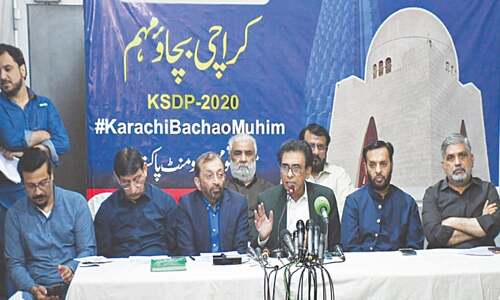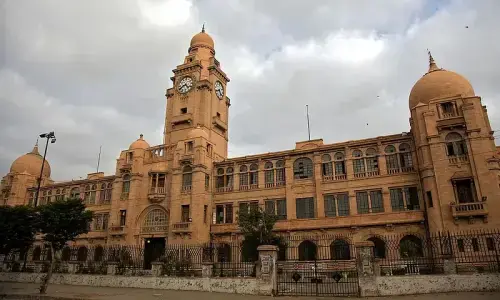KARACHI: How could a government plagued with corruption and nepotism, a so-called democracy which has miserably failed to serve its people in every sector for the past many years, be it disposal of refuse or running of primary schools, make the right decisions for universities?
This question was repeatedly raised by speakers who had gathered at Karachi University (KU) on Thursday to register their strong opposition to the recently passed Sindh Universities and Institutes Law Amendment Bill 2018.
The programme was organised by Joint Action Committee, a recently created KU forum comprising representatives of teachers, non-teaching staff and students, at the university’s chemistry department auditorium.
Describing the bill as an attempt to make universities subservient to the government, speakers strongly criticised the performance of the government and questioned its ability to look after the affairs of universities when it had failed poorly to provide basic necessities of life to citizens.
‘They don’t even have the capacity to take care of matters at the union council level’
“They don’t even have the capacity to take care of matters at the union council level. We need to ask what the government has done with the administrative and financial powers they have been exercising for a long time? Has it ever been held accountable for that?” asked Prof Fayyaz Vaid, senior KU teacher.
On the question of autonomy and accountability of universities, he said they had statutory bodies, for instance the senate, the syndicate and the academic council having representation from teachers as well as the government.
Criticising the bill, Prof Vaid said that the government should have enhanced teachers’ representation on the statutory bodies instead of reducing it as the number of teachers had increased multiple times since 1972.
Lamenting that some of his colleagues busy in the syndicate’s forthcoming elections couldn’t take out time for the event, he said that the exercise would be futile if the government implemented the bill as it would lead to the formation of a powerless syndicate.
Prof Tauseef Ahmed Khan of the Federal Urdu University of Arts, Science and Technology described the bill as an attack on universities. “It will not only harm the PPP itself but also damage democratic values and structures in the country.”
He, however, was of the opinion that transfer of powers from the governor to the chief minister was a non-issue since the 18th Constitutional Amendment envisaged devolution of powers from the federal government to provinces. The actual problem was the government actions aimed at destroying university autonomy.
‘Occupying universities’
While the bill drew strong criticism from all speakers, one of the harshest speeches was delivered by advocate Saifuddin, a KU alumnus.
“There is no ambiguity that the bill is based on ill intentions. It makes very clear that the government wants to occupy universities by taking complete control over its administrative and academic matters, resources and land,” he observed, questioning whether this was a democratic government.
“No, this is not. It’s shameful that we have reached a stage that governments have no qualms in bringing laws which are individual-specific rather [than] for general good,” he said, referring to a recent law passed by the National Assembly to help former prime minister Nawaz Sharif become president of his party.
The university bill, he continued, would not only affect KU but 24 universities of Sindh, including the NED University of Engineering and Technology.
Condemning Sindh Senior Minister Nisar Khuhro’s statement in which he said that the government’s providing of huge funding to universities justified its looking into their affairs, he said: “Is this money coming from their pockets? It’s our money that they spend [it] on us.”
Education, he said, was never the PPP’s priority.
‘Army too gets govt funds’
Raising similar concerns, Khizr Hayat, representing the Human Rights Commission of Pakistan, also flayed Mr Khuhro’s remarks and made an interesting observation.
He said: “The army also gets funds from the government, which amounts to billions of rupees. Why doesn’t the government conduct an audit of that amount and look into their affairs as well? We respect provincial autonomy and want more powers for provinces. Similarly, what is important is to have institutional and academic freedom.”
The government, he said, must be shown a mirror reflecting its pathetic performance especially in the education sector.
Citing Sindh government data, he said enrolment in the public sector primary schools in Karachi had dropped drastically over the decades and presently only seven to eight per cent children were enrolled in these schools.
“Where the 93pc children are studying? I am sure neither the Sindh government nor Mr Khuhro has any idea about it,” he said, asking what could be a bigger incompetence on part of the government than this.
According to him, the Sindh government data shows that 55pc public schools have no electricity, 36pc have no washrooms, 42pc have no supply of drinking water, 50pc have no science labs whereas 98pc have no libraries.
“This whole situation is highly shameful and regretful given the fact that Karachi has the highest contribution to government resources at the provincial and federal levels,” he said, calling for building pressure on the government to withdraw the bill.
Equally resentful against the government actions was Dr Shakeel Farooqi, the secretary general of the Federation of All Pakistan Universities Academic Staff Association. He agreed with Mr Saifuddin that the bill was a strategy to take control of university resources and its land.
“The chancellor must be apolitical. If he is a political worker, he should be thrown out,” he said, vowing to continue struggle against the bill.
He strongly criticised the government for not restoring student unions which once provided genuine leadership to the country. The so-called democratic governments, he said, felt threatened by student unions which explained their reluctance to restore these bodies.
Former KU vice chancellor Prof Zafar Saeed Saifi recalled how he and past vice chancellors of the university resisted government interference and pressures in administrative and academic matters.
Ali Murtaza of Sindh Professors and Lecturers Association, Waqar Ahmed of KU employees association, Abdul Baseer Husaini of Islami Jamiat Talaba and Mubashir Mirza of All Pakistan Muttahida Students Organisation also spoke.
Published in Dawn, April 6th, 2018


































